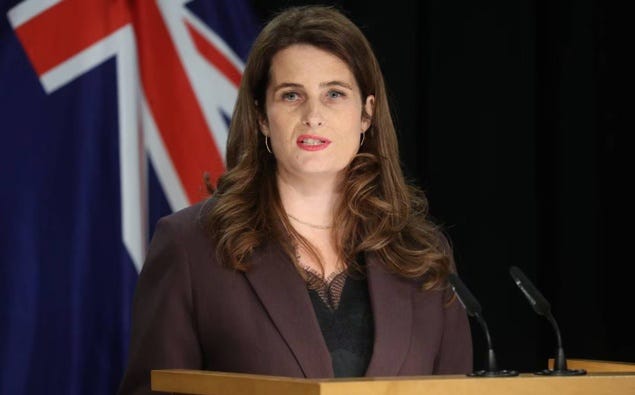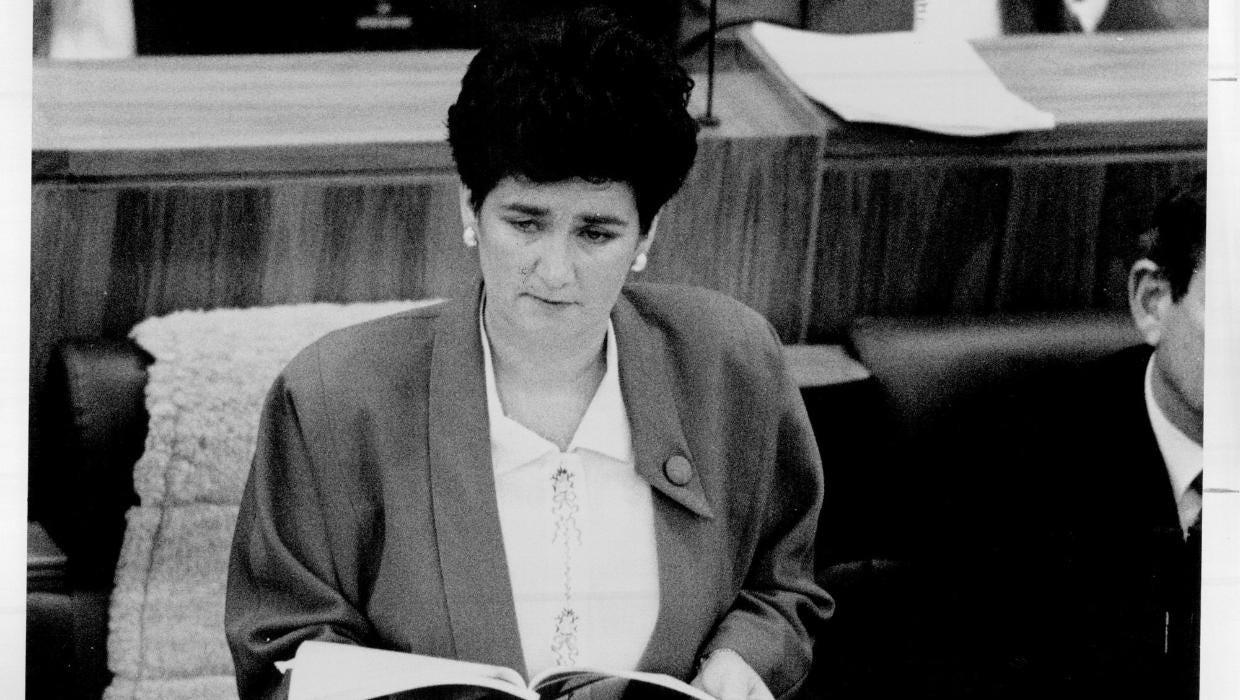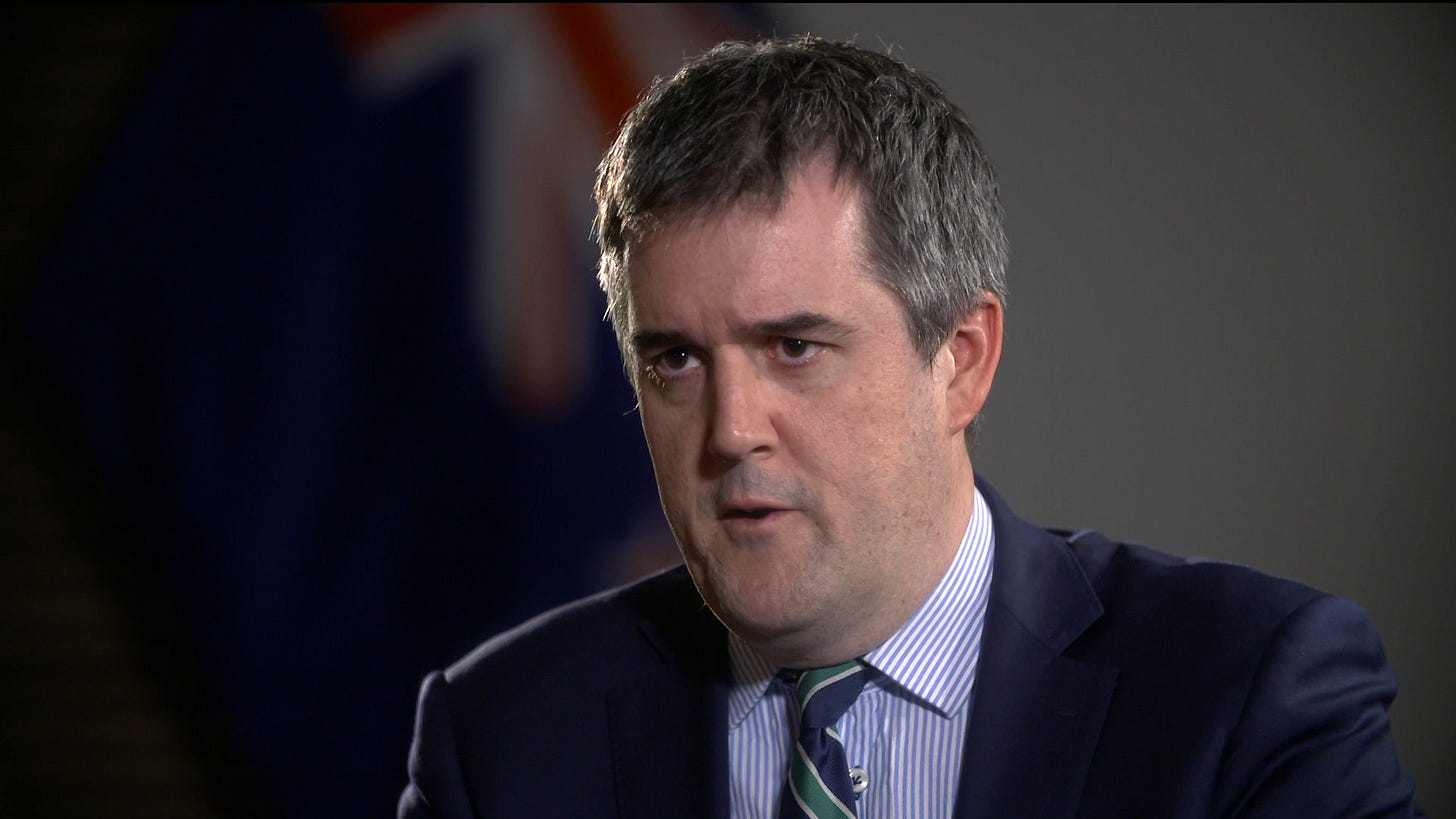Nicola Willis promised discipline. She promised to rein in spending, shrink the bloated public service, and put New Zealand’s economy “back on track” after Labour’s disastrous run. Instead, she has drifted. Spending remains high, the bureaucracy is still bloated, and taxpayers see little sign of the tough decisions we were promised.
The result? Labour, of all parties, is polling neck and neck with National, less than 13 months out from the election. That should be a political impossibility, given the wreckage they left behind. But it speaks to the central failure of National and its Finance Minister. Voters expected change, and what they got instead was continuity.

Labour added more than 14,000 new public servants in six years. Ministries like the Ministry of Business, Innovation, and Enterprise, Ministry of Social Development, and Ministry of Education became sprawling empires, gobbling up billions for policy advisors, communications staff, and layers upon layers of management. Treasury ballooned, Kāinga Ora turned into a sinkhole of money and mismanagement, and countless “climate” and Te Tiriti units sprouted in every department, each producing glossy reports but little action.
And what has Willis done to change it? A few headline-grabbing restructures, followed by the same old bureaucratic game of restructure musical chairs. People made redundant on Monday were rehired on Tuesday into newly created “advisory” roles. The overall size of the machine has barely shifted.
Take Kāinga Ora. Labour poured tens of billions into a housing agency that can’t balance its own books, let alone house people effectively. It has more spin doctors than most ministries have policy staff. And yet Willis has kept it staggering on, despite warnings from Treasury itself that the agency is financially unsustainable.
Or look at the endless climate bureaucracy. Labour left behind over 200 separate climate-related roles scattered across government. Instead of consolidating and stripping back, Willis has allowed them to continue pumping out “roadmaps,” “transition plans,” and “engagement strategies” that change precisely nothing about our emissions trajectory, but cost millions in salaries and consultants’ fees. These are not marginal sums. They are symbols of a government that refuses to take the axe to wasteful spending.
Nicola Willis likes to remind the press that she is “not Ruth Richardson.” She seems terrified of being painted as “heartless” or “harsh.” But this fear is exactly the problem.

New Zealand doesn’t need a Finance Minister who wants to be liked by the Wellington commentariat. It needs one who will take on the entrenched public service machine and force it to shrink. Ruth Richardson was hated by many in her day and since, but she saved New Zealand from collapse. She had the courage to do what was necessary, not what was popular.
Willis, by contrast, is actively avoiding what could be her Ruth Richardson moment. She had the mandate. She had the timing. She had the opportunity to make real cuts and reset expectations. Instead, she choked.
It is not just armchair critics who are questioning Nicola Willis’s performance. Heavyweights of New Zealand’s economic and political world have already sounded the alarm. Sir Roger Douglas, the architect of the 1980s reforms, has been blunt: Willis “is not up to the job and is not levelling with the New Zealand public.” He and University of Auckland economics professor Robert MacCulloch argue that Willis is misleading voters with talk of a return to surplus, when Treasury’s own forecasts show ballooning deficits driven by pensions, health, and the long-term costs of an ageing population. MacCulloch has gone further, accusing Willis of “creative accounting” and warning that the country’s finances are being misrepresented. Their message is stark: without decisive action, New Zealand is headed toward bankruptcy.
From the right-wing policy think-tank world, the warnings are just as sharp. Eric Crampton, chief economist at the New Zealand Initiative, has cautioned that Willis’s modest spending trims are nowhere near enough to stop fiscal drift, describing the Budget’s operating allowances as far too soft. Oliver Hartwich, the Initiative’s executive director, has compared today’s fiscal challenge to the 1980s, pointing to a “gaping structural budget deficit” and sluggish productivity. He has noted with concern that government spending under Willis remains higher as a share of GDP than it was under Grant Robertson, raising the uncomfortable question of whether National is simply entrenching Labour’s legacy.
The Taxpayers’ Union has been just as scathing. They accuse Willis of talking tough on spending while presiding over record-high outlays, effectively doubling down on “Grant Robertson economics.” They argue that instead of laser-focusing on wasteful agencies, Willis has been distracted by trivia and political positioning. In their words, the government should be “getting its fiscal house in order” rather than patting itself on the back for modest restraint that does little to dent the bloated state.
Taken together, these voices paint a picture of a Finance Minister who has squandered her mandate, fiddling at the edges while debt climbs, bureaucracy swells, and voters grow restless. When figures of this calibre are calling time on a sitting Finance Minister, it is no longer just commentary. It is a warning.
The uncomfortable truth is that if Nicola Willis cannot do the job, someone else must. And there is only one real alternative: Chris Bishop.

Bishop has already proven he can deliver. His work in Housing and Infrastructure has been disciplined, results-oriented, and clear. He is across the detail, he can explain policy in plain English, and he has earned public credibility. To be blunt, he is the National minister in this Cabinet who has shown the spine and skill to handle Finance. Naturally, there is no way the portfolio would be assigned to a coalition partner minister.
I am reluctant to see him moved from his existing portfolios as New Zealand desperately needs results in both Housing and Infrastructure, but if the Finance Minister’s job must be done properly, Bishop is the only credible choice.
New Zealanders are tightening their belts. Families are cutting back on groceries, mortgage holders are under crushing pressure, and small businesses are hanging by a thread. Against that backdrop, a Finance Minister who won’t cut spending is a liability.
The government is running out of time. Nicola Willis’s refusal to take Ruth Richardson style action risks turning 2026 into a bloodbath. Voters won’t reward timidity. They won’t re-elect a government that fiddled at the edges while the country slid backwards.
Willis can still turn this around, of course, by taking the axe to bloated agencies, cancelling vanity projects, and proving she is willing to be unpopular in the pursuit of economic sanity. But if she won’t, then the time has come to ask the hard question: is Nicola Willis the Finance Minister New Zealand needs, or is it time for Chris Bishop to step up?
Ani O'Brien comes from a digital marketing background, she has been heavily involved in women's rights advocacy and is a founding council member of the Free Speech Union. This article was originally published on Ani's Substack Site and is published here with kind permission.


17 comments:
Ruth Richardson's comments are sensible. Roger Douglas' comments are stupid. He had his time. He is even criticising David Seymour. Does he want the other lot?
She is trying to change the wheel on burning car. Chris Bishop has no financial qualifications as far as I am aware. I believe Brooke van Velden does! Why not a competent coalition partner?
A fine article Ani. You articulate the "Ardern like" Willis' lack of talent / intelligence / relevant experience / actions and results admirably.
But you've missed the elephant in the room.... Willis is a dishonest hustler, who like Ardern, is setting up her comfortable post politics life at the expense of Kiwi battlers
Stuff reported a Kiwi family of four pays $10,000 a year more on groceries than our Auatralian cousins.
Willis is responsible for dismantling the price colluding supermarket duopoly.
Willis spent the last 2 years conducting a supermarket study which told her nothing countless previous studies haven't already uncovered.
Willis is currently pretending to fix the largest business fraud in NZs history. But without vital wholesale food market access reform (as identified by com com 2022), Willis reforms are a greater subterfuge than the climate disaster fraud.
The most worrying part is Luxon is backing "his friend" Nicola all the way to a possible election defeat.
Why Mr Luxon?
This is what I wrote to my electorate mp. ::
I am writing as a constituent who voted National at the last election, but your party has now lost my party vote — and your electorate vote is no longer a certainty.
Your win over Kieran McAnulty was narrow, and it was only made possible by the Greens running a weak candidate in Celia Wade-Brown, splitting the loony-left vote. That should be a warning: the margin is slim, and the electorate’s patience is thinner still.
National campaigned to cut waste and restore fiscal discipline after six years of Labour mismanagement. Yet under your leadership, and with Nicola Willis at the helm of finance, the Government has:
• Taken a “softly, softly” approach to spending cuts, leaving overall government spending on an upward trajectory.
• Preserved, or even increased, bureaucratic headcount compared with the time of the election.
• Borrowed relentlessly, with debt set to hit $300 billion — $145,000 for every household — while claiming a pseudo-surplus through creative accounting measures.
• Left households and businesses to absorb the consequences: a shrinking economy, high cost of living, and daily borrowing of $75 million just to keep the lights on.
The public wants real cuts, fiscal responsibility, and a Government prepared to tackle the structural rot left by the last administration. Instead, we are seeing half-measures and soft rhetoric.
This is compounded by Luxon’s failure to confront Treaty/co-governance, DEI and “woke” policies, and the ongoing ideological drift at TVNZ and RNZ. Ordinary New Zealanders are paying the price — and National will be blamed if nothing changes.
Moreover, the judiciary is undermining the Government’s efforts to enforce the gang patch ban. In a recent ruling, Lower Hutt District Court Judge Bruce Davidson interpreted the phrase “otherwise disposed of” in the Gangs Act 2024 to mean that courts have discretion to return confiscated gang insignia to offenders. This decision challenges the Government’s stance and highlights a lack of cohesive action on this issue.
I am laying this squarely at the feet of Christopher Luxon and his Cabinet. Your leaders, Mr Butterick, is being judged not by rhetoric but by outcomes. Unless National shows courage, decisiveness, and fiscal discipline — quickly — you risk losing not just my vote but those of many others in your electorate.
Turn the ship around now, or the loony left will be back in charge. The choice is yours.
the Government’s economic story so far. A slick launch, big promises, and then ... nothing
It is a difficult one as nearly 50% of the population appear to be happy with the concept of a Labour/Greens/TPM Government. This means a desire for large tax increases and a significant move forward on Co-Governance.
Yes BVV has a degree in Economics. Also Andrew Bayley - a finance man and Simon Watts - accountant. Why does Luxon use pro-Maori lawyers all the times?
Her contacts inside Nat.) . Luxon is still hoping to gain a sufficient National result in 2026 to negotiate a new coalition with any party at all that can give National the majority ( however slim).
Could Nat and Labour be in competition to see who gets He Puapua ( - tribal rule) over the line by 2040 ? Certainly looks that way now.
"no Ruth Richardson" - no Finance Minister more like. About the only defence for Willis I can offer is that she has been ham-strung by an inept Prime Minister. That being the case, Chris Bishop or any other candidate doesn"t have any hope either.
God points but I feel it is not Nicki alone responsible for the non-action.
National are too scared to make the big changes. The media back the baying unions all the way and are responsible as well .
The public service and local government staff numbers and salaries are out of control.
We are heading for a difficult time.
Thx Anon. your comment about Willis' contacts provides the missing piece of the puzzle.
Willis was also a director of the New Zealand Initiative, an organisation set up and funded to represent and protect price colluding NZ businesses.
Kiwis will find Investopedia's definition of cartels, eerily familiar.....
Cartels form to fix prices, set trading terms, allocate trade zones, or gain economies of scale. A cartel's power often relies on the host country's leadership, and it may not face challenges on pricing or production. While the members of a cartel profit from the agreement, both competition and the consumer suffer.
Pros (for Willis' post politics pension providers)
Provides a monopoly-like power to its members
Savings for members is achieved through economies of scale
Products or services are sold at higher margins to maximize profit
Cons (for Kiwi battlers paying $10,000 a year more for food than aussies)
Discourage new entrants into the market and act as a barrier to entry
Lack of competition leads to price fixing & lack of innovation / productivity
Impact consumers as prices are over market price
Are you mad Anon 0730? BVV can't even find where the taxpayer funded $74.4b uncontrolled covid spend went. Mind you, neither can the auditor general who labelled the covid spend UNCONTROLLED!
Still not convinced you're wrong?
Watch this train wreck BVV interview...
https://www.youtube.com/watch?v=-IheEXRocjo
Reduce the deficit by cutting spending on bloated bureaucracies, spin doctors, and consultants? Who could disagree. But when we hear Professor MacCullock talking about "ballooning deficits" driven by pensions, health, and the long-term costs of an ageing population," we can be excused for thinking the intention is to make working people pay for the government's fiscal crisis through cuts to essential services.
But of course there are two sides to a government's books - revenue and spending. Why is it that commentators like Ani O'Brien and the "experts" she quotes only ever focus on the latter? The fiscal deficit could also be directly addressed by increasing government revenue through increased taxation on those who can afford it. But no doubt our "experts" would object that this would only kill the incentive for capitalists to invest. So we are left with the old "trickle down" theory - create the conditions for the rich to get richer and hope everyone is lifted up by their rising boats. But where has this ever worked?
Ani, another great commentary but, it's not all down to Willis - Luxon also needs to go. And how is 'tightening our belt' going when, Potaka informs us we're spending a $billion on promoting Te Reo? It might be small change in the overall scheme of things, but that could still fund a significant infrastructure project, or a lot of cancer drugs etc. Where was/is the public mandate for this? And, where they had one - to get us 'back on track' - why are we still struggling in so many areas, or is a lot of it down to the reinvention of the Treaty?
It is possible that there is more that one economically illiterate person giving out reckons and / or being minister of finance
A $Billion on Te Reo BS but only $20M for the latest 'Health initiative" - so who has priorities more than a bit cocked up? National - that's who!
Dear Roger Douglas. Please keep in mind he was Minister of Finance in the Lange Govt and when H Clark & her band of Academics entered the Labour Party, Roger was "shown a door" marked exit, so he crossed the room and started the ACT Party.
Roger 'the man' who is attributed with "selling" NZ to the Australians, especially the Banking sector.
Yup, it must be hard becoming the Minister of Finance, in an incoming Govt, knowing full well, the previous Min. Finance has 'cooked the books, and spent up large'.
And to top it all off, Heinz Wattie's are "going to pay the NZ growers of NZ peaches to pull their trees out".
So instead of having an industry, that can assist the economy, product, production plus, we will now have that fruit imported, already in cans, just as it is happening now.
Tongue in 'cheek', I wonder if Ice Cream will be next, as an import??
Post a Comment
Thank you for joining the discussion. Breaking Views welcomes respectful contributions that enrich the debate. Please ensure your comments are not defamatory, derogatory or disruptive. We appreciate your cooperation.